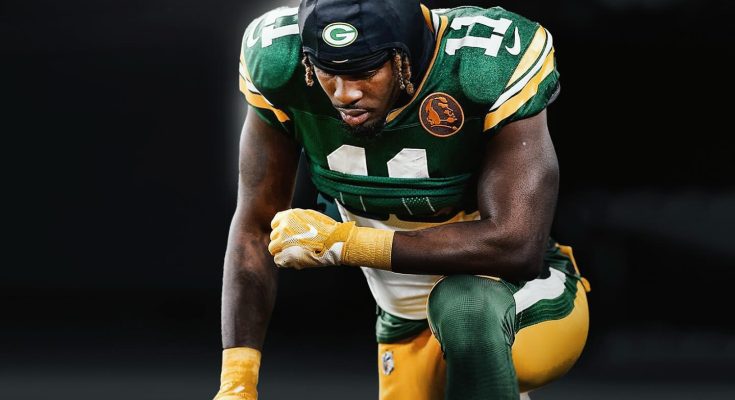The Green Bay Packers were dealt a serious blow during tonight’s game when wide receiver Jayden Reed went down with what has now been confirmed as a broken collarbone. The news was made official after the game by head coach Matt LaFleur, who stated that Reed is out indefinitely and will miss a significant amount of time, though the expectation is that he will return later in the season. For the Packers, who had built much of their offensive identity around Reed’s versatility and dynamic playmaking ability, this development is nothing short of devastating. It immediately raises pressing questions about how the team will adjust its offensive scheme, who will step up in Reed’s absence, and what the long-term outlook is for their season.
Jayden Reed had become one of the central figures of Green Bay’s offense, an emerging star who quickly earned the trust of quarterback Jordan Love and the coaching staff. Drafted for his speed, route-running precision, and ability to make plays after the catch, Reed had taken on responsibilities beyond what many expected of a young wideout. He was not only a reliable target but also a weapon that the Packers utilized in creative ways—on jet sweeps, screens, and special teams. His versatility made him indispensable, and his injury leaves a gaping hole that cannot be easily filled. For a team already balancing the fine line between being a legitimate contender and one still developing its young core, losing Reed for an extended period is the kind of setback that can reshape the narrative of a season.
The timing of the injury is particularly painful. The Packers were beginning to establish momentum, with Reed showing increasing chemistry with Love as the season progressed. His knack for finding open space, breaking tackles, and giving the offense a jolt of energy made him a go-to playmaker in clutch moments. This collarbone injury now forces LaFleur and his staff to reassess their offensive blueprint. Unlike some injuries where a backup can seamlessly step in, Reed’s skillset is unique, and replacing him is more about adjusting the scheme than simply slotting in another wideout.
LaFleur acknowledged the challenge during his postgame remarks. He emphasized the team’s belief in Reed’s eventual return but was realistic about the long stretch ahead without him. That leaves the spotlight on Green Bay’s other receivers and offensive pieces. Christian Watson, Romeo Doubs, and Dontayvion Wicks will all be expected to elevate their games. Watson brings the size-speed combination that makes him a threat downfield, but he has battled consistency and injuries himself. Doubs has been reliable as a possession receiver but lacks Reed’s explosiveness. Wicks has flashed potential, but asking him to replicate Reed’s production could be unfair. Beyond the wide receiver corps, the Packers may lean more heavily on their tight ends and running backs to fill the gap in the passing game.
Another angle to consider is Jordan Love’s development. The young quarterback has leaned on Reed as a safety valve, particularly when plays break down. Reed’s ability to create separation quickly gave Love a dependable outlet. Without him, Love will be challenged to adapt, distribute the ball more evenly, and build trust with other receivers. This could accelerate his growth, but it could also test his patience and decision-making under pressure. The connection between Love and Reed had been one of the more promising storylines for Green Bay, and its interruption is a setback not just for the offense but for the quarterback’s progression.
The injury also highlights the unpredictable nature of the NFL. One moment, a player is an integral part of a team’s strategy, and in the blink of an eye, an injury changes everything. For Reed, breaking a collarbone is a cruel twist, especially given the physical demands of his position. Wide receivers rely on their upper body strength for everything from fighting through press coverage to securing contested catches. Recovery timelines for a broken collarbone can vary, but even with the most optimistic outlook, he will miss weeks of action. The fact that LaFleur expects him to return later in the season is a silver lining, but it still means the Packers must navigate a significant portion of the schedule without one of their most dynamic weapons.
Fans are already expressing both heartbreak and resilience. Social media has been flooded with messages of support for Reed, whose fiery style of play had quickly made him a fan favorite. Green Bay fans, long accustomed to seeing star receivers thrive in their system, had embraced Reed’s breakout as a sign of a bright future. His absence will sting, but the fanbase is equally aware of the opportunities it presents for others. This next stretch of games will reveal much about the depth of the Packers’ roster and the adaptability of their coaching staff.
From a broader perspective, Reed’s injury also affects the NFC landscape. The Packers are in the thick of a competitive playoff race, and losing a player of Reed’s caliber could tip the scales. Every game in the NFL matters, and the difference between making the playoffs or falling short often comes down to injuries like this. Opposing defenses, no longer having to account for Reed’s explosiveness, may adjust their strategies, focusing more on limiting Watson or stacking the box against the run. Green Bay will need to stay creative to avoid becoming predictable.
Special teams could also feel the impact. Reed had been a contributor in that phase, and his absence means someone else must step up to handle those responsibilities. It’s yet another reminder that an injury doesn’t just affect one area but can ripple across all facets of the team. The Packers’ depth will be tested not just at wide receiver but across the roster.
For Reed himself, the road to recovery begins now. Injuries are not just physical but mental battles. He will need to stay engaged with the team, continue to learn and support his teammates from the sidelines, and keep his confidence intact as he works his way back. Many players have returned from collarbone injuries to have successful careers, and Reed’s youth and resilience are in his favor. But for a competitor who thrives on being in the action, the months ahead will require patience and determination.
There is also a question of how the Packers will manage his return. Rushing a player back from a collarbone injury can be risky, especially in a sport as physical as football. The team will have to balance their need for his playmaking ability with the importance of ensuring he is fully healed. A setback could jeopardize not just this season but Reed’s long-term trajectory. Green Bay has traditionally taken a cautious approach with injured players, and that philosophy will likely continue here.
The leadership within the locker room will play a critical role in weathering this storm. Veterans on the team will need to rally the younger players, keeping morale high and reminding everyone that the season is far from over. Injuries are part of the NFL, and the best teams find ways to overcome them. For LaFleur and his staff, this is a chance to prove their adaptability, their ability to maximize the strengths of whoever is available, and their resilience in the face of adversity.
The next few weeks will be pivotal. If the Packers can stay afloat and even thrive without Reed, his eventual return could serve as a late-season boost that propels them into the postseason with renewed energy. Conversely, if the offense sputters and the losses pile up, his absence could be remembered as the turning point in a campaign that once held great promise. That’s the harsh reality of the NFL—injuries don’t just affect players, they can define seasons.
In Green Bay’s long history, there have been many instances of stars going down and the team finding a way forward. The Packers’ culture, steeped in resilience and a never-say-die attitude, will be tested once again. Jayden Reed’s injury is a setback, but it’s also an opportunity for others to step into the spotlight. Whether it’s Watson breaking out as a true number one option, Doubs becoming more consistent, or an unheralded player emerging, the void left by Reed could be the catalyst for growth elsewhere.
Ultimately, tonight’s news is a reminder of the fragility of success in the NFL. Jayden Reed, a rising star with so much promise, now faces weeks of recovery instead of the thrill of game day. The Packers, meanwhile, must regroup, adjust, and press forward. There will be challenges ahead, but also chances for new heroes to emerge. And when Reed eventually returns, his comeback will be one of the most anticipated moments of the season, not just for the Packers but for the league as a whole. His injury is a painful blow, but it does not end the story—it merely sets the stage for a new and perhaps even more compelling chapter in Green Bay’s season.



